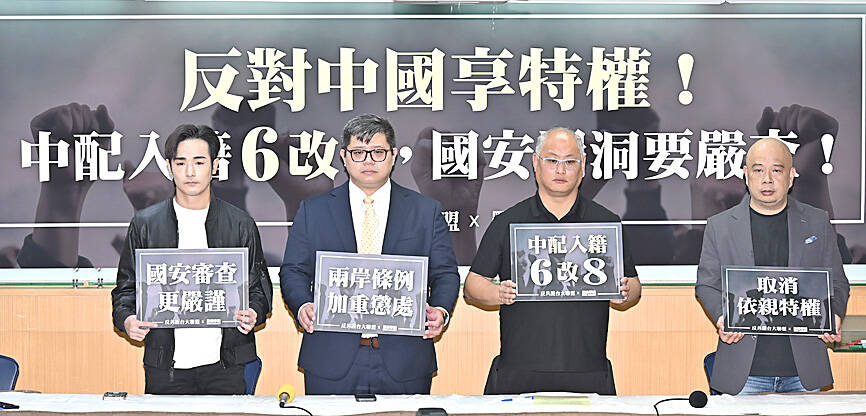The minimum time required for naturalization of Chinese spouses should be extended from six years to eight years, civil groups said yesterday, adding that the government should ban rhetoric advocating war the same way the German government bans the display of Nazi symbols and gestures.
Members of the Kuma Academy and Anti-Communist Volunteers Alliance jointly petitioned the government at a news conference to enforce a stricter immigration policy for Chinese spouses.
They made the call after the National Immigration Agency revoked the permanent residency permit of Chinese influencer Liu Cheng-ya (劉振亞), known as “Yaya in Taiwan” (亞亞在台灣), who is married to a Taiwanese, for advocating the military takeover of Taiwan by China on the Internet.

Photo: Tu Chien-jung, Taipei Times
Liu was ordered to leave the country after her residency permit was revoked.
She first defied the order by filing an injunction, which the Taipei High Administrative Court denied.
Yesterday morning she vowed to stay in the country, but changed her mind and left in the evening.
China has never changed its intention to invade Taiwan and has been seeking to destroy democracy and freedom in the nation through military exercises, disinformation and other infiltration techniques, said democracy advocate Lee Ming-che (李明哲), who was detained by the Chinese government for five years on charges of inciting subversion of state power.
Lee cited a Freedom House report published this year, which said there were 160 transnational repression incidents last year.
The report said that the “Chinese Communist Party remains the world’s leading perpetrator of transnational repression and is responsible for 272 recorded physical incidents since 2014.”
People working for the Chinese Ministry of State Security in March last year tried to kidnap a Chinese dissident and force him onto an international flight at Paris Charles de Gaulle Airport, it said.
Many countries have condemned China for recruiting Chinese expatriates to intimidate dissidents and foreign politicians critical of China, Lee said.
“When stipulating policies and regulations related to China, including the naturalization policy for Chinese spouses, the government needs to take into account facts related to the Chinese government,” Lee said.
The Taiwanese government should make laws to regulate speech advocating war and spreading hatred in the same way that the German government bans the display and promotion of Nazi symbols and gestures, he said.
“The government should particularly be serious about speech advocating for the unification of Taiwan by force, as they are completely destroying the foundation of freedom of speech, democracy, freedom and human rights,” he said.
Kuma Academy chief executive officer Chu Fu-ming (朱福銘) said the groups are petitioning for the minimum number of years required for Chinese spouses to be naturalized being extended to eight years from six.
Chinese spouses who publicly advocate for China to take over Taiwan by force should not be naturalized, Chu said, adding that taxpayer money should not be spent on people who “commit treason” and “threaten” national security.

Taiwan has received more than US$70 million in royalties as of the end of last year from developing the F-16V jet as countries worldwide purchase or upgrade to this popular model, government and military officials said on Saturday. Taiwan funded the development of the F-16V jet and ended up the sole investor as other countries withdrew from the program. Now the F-16V is increasingly popular and countries must pay Taiwan a percentage in royalties when they purchase new F-16V aircraft or upgrade older F-16 models. The next five years are expected to be the peak for these royalties, with Taiwan potentially earning

STAY IN YOUR LANE: As the US and Israel attack Iran, the ministry has warned China not to overstep by including Taiwanese citizens in its evacuation orders The Ministry of Foreign Affairs (MOFA) yesterday rebuked a statement by China’s embassy in Israel that it would evacuate Taiwanese holders of Chinese travel documents from Israel amid the latter’s escalating conflict with Iran. Tensions have risen across the Middle East in the wake of US and Israeli airstrikes on Iran beginning Saturday. China subsequently issued an evacuation notice for its citizens. In a news release, the Chinese embassy in Israel said holders of “Taiwan compatriot permits (台胞證)” issued to Taiwanese nationals by Chinese authorities for travel to China — could register for evacuation to Egypt. In Taipei, the ministry yesterday said Taiwan

Taiwan is awaiting official notification from the US regarding the status of the Agreement on Reciprocal Trade (ART) after the US Supreme Court ruled US President Donald Trump's global tariffs unconstitutional. Speaking to reporters before a legislative hearing today, Premier Cho Jung-tai (卓榮泰) said that Taiwan's negotiation team remains focused on ensuring that the bilateral trade deal remains intact despite the legal challenge to Trump's tariff policy. "The US has pledged to notify its trade partners once the subsequent administrative and legal processes are finalized, and that certainly includes Taiwan," Cho said when asked about opposition parties’ doubts that the ART was

If China chose to invade Taiwan tomorrow, it would only have to sever three undersea fiber-optic cable clusters to cause a data blackout, Jason Hsu (許毓仁), a senior fellow at the Hudson Institute and former Chinese Nationalist Party (KMT) legislator, told a US security panel yesterday. In a Taiwan contingency, cable disruption would be one of the earliest preinvasion actions and the signal that escalation had begun, he said, adding that Taiwan’s current cable repair capabilities are insufficient. The US-China Economic and Security Review Commission (USCC) yesterday held a hearing on US-China Competition Under the Sea, with Hsu speaking on